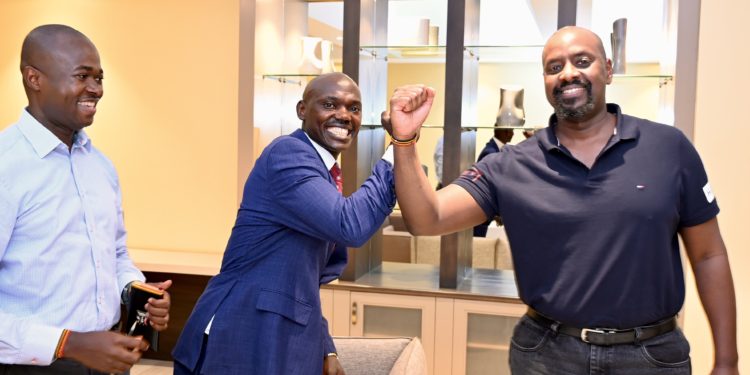By CHANGE OF GUARDS
The Muhoozi Project, a plan that has been in motion for over two decades, aims to position Museveni’s son, Crown Prince Gen. Muhoozi, as the future president of Uganda. This strategy involves irregular military enrollment, swift promotions, preferential treatment, and various assignments. Over the last three years, the project has become more apparent as Gen. Muhoozi openly declares his intentions to succeed the presidency. Operating under the MK Movement, he actively participates in state-sponsored nationwide political mobilization.
However, internal opposition to the project has compelled a reassessment. As a result, it has transformed into a pseudo-non-governmental organization known as the Patriotic League of Uganda (PLU). Launched just last week, the PLU has announced its inaugural rally in Masaka on March 17, 2024, with Gen. Muhoozi slated to be the guest of honor. This shift in strategy may indicate an attempt to navigate challenges and garner support for his presidential aspirations.
Historically, Buddu has thrived as the primary source of sustenance for Kampala city, excelling particularly in coffee production with unmatched prowess. Many of its residents have risen to prominence, dominating the private business sector in Kampala.
Demographically, Buddu is characterized by a population primarily composed of indigenous Baganda and Banyarwanda settlers. Notably, the Banyarwanda settlers in Buddu have experienced a degree of local integration, a departure from the situation in other regions where they have settled. The predominantly Catholic faith of the Banyarwanda in Buddu has played a crucial role in fostering this integration. Another significant factor is the diverse composition of the Banyarwanda community in Buddu, encompassing both Hutu and Tutsi ethnic groups.
During the 1980 General Elections, Buddu demonstrated overwhelming support for the Democratic Party (D.P), securing victory in all nine constituencies. A noteworthy aspect is that, while Banyarwanda in other regions aligned with Museveni’s sectarian Bush War, those in Buddu did not join the movement. Even throughout the four months of the well-known 1985 battle for Katonga stalemate, the National Resistance Army (NRA) did not witness a significant increase in enrollment from Buddu.
However, since assuming power, certain individual Banyarwanda have strategically aligned themselves with the Museveni regime for opportunistic reasons. It has become customary for every Munyarwanda in Uganda to rally behind the Museveni regime. In the recent general elections, Museveni experienced a humiliating loss to the opposition National Unity Platform (NUP) in the Buddu region. He attributed this defeat to tribal and religious sectarianism.
Presently, a power struggle within the opposition NUP is unfolding around the Masaka region. While not explicitly stated, some individuals rightly attribute this development to the invisible influence of the Museveni regime.
It is a verifiable fact that the Museveni regime has been actively working to regain influence in the Buganda region. Acknowledging the impossibility of reconciliation with the Baganda, the regime has shifted its focus toward isolation as a strategy. This move is part of a larger plan to assert control over the Buganda Kingdom and the region. Notably, even Munyarwanda Member of Parliament from Lwengo, Twaha Kagabo, initially elected on the opposition National Unity Platform (NUP) ticket, has joined the Muhoozi Project. Unlike the Muganda NUP MP for Njeru, Jimmy Lwanga, who also aligned with the Muhoozi Project, Twaha Kagabo recently held a meeting with Museveni. The details of their discussion and any agreements reached could be a contributing factor to the Patriotic League of Uganda (PLU) prioritizing Masaka. It is also worth mentioning that the emergence of internal issues within the opposition NUP coincides with developments in Masaka.
Keep an eye on this space for further developments.








Discussion about this post